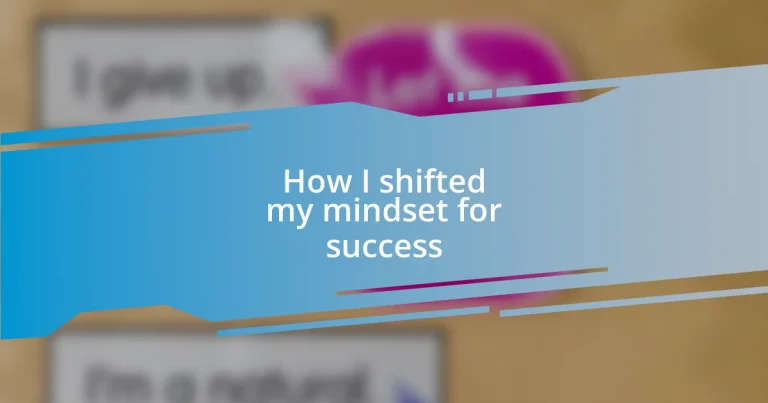Key takeaways:
- Shifting from a limiting mindset to a growth mindset transformed the author’s perspective, leading to personal and professional growth.
- Identifying and challenging limiting beliefs through methods like journaling and reframing helped replace negative thoughts with empowering ones.
- Setting clear goals and incorporating daily positive habits, such as gratitude and mindfulness, were essential for maintaining motivation and progress.
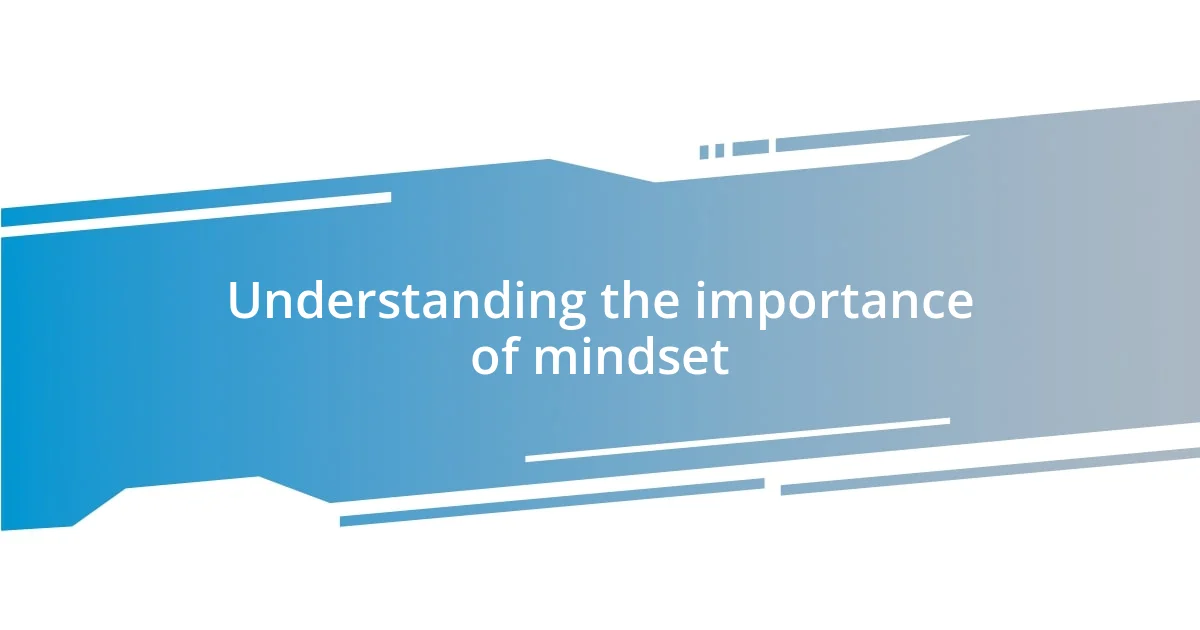
Understanding the importance of mindset
Mindset is truly a game-changer. When I decided to shift my focus from limitations to possibilities, everything transformed in my life. I remember feeling stuck in a job that didn’t fulfill me, but a simple change in how I approached challenges opened up opportunities I never imagined.
Have you ever faced a situation that felt insurmountable? I have, and I realized that my perspective dictated my experience. It’s fascinating how adopting a growth mindset—the belief that abilities can be developed—encouraged me to embrace challenges rather than shy away from them, leading to unexpected personal and professional growth.
The power of mindset can’t be overstated; it’s like a compass guiding us through uncertainty. I once doubted my ability to lead a project, but when I started believing in my potential, not only did my confidence soar, but I also inspired my team to aim higher. Embracing a positive mindset isn’t just about feeling good; it’s about creating a ripple effect that influences those around us.
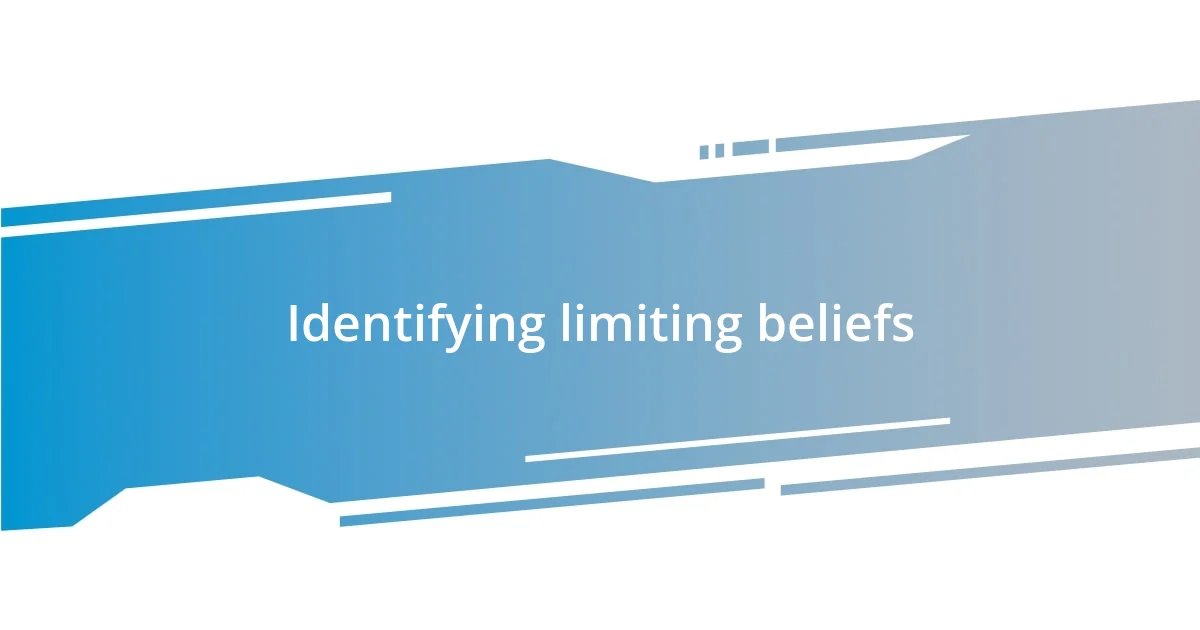
Identifying limiting beliefs
When I began to examine my inner dialogue, I was surprised by how many limiting beliefs I had internalized over the years. For instance, I used to think that I wasn’t skilled enough to pitch my ideas effectively. This fear held me back until I realized that any skill can be learned with practice, and acknowledging that was my first step toward growth.
Identifying these beliefs wasn’t an easy task. I remember writing down thoughts that surfaced during my self-reflection sessions. Each time I uncovered a limiting belief, I challenged it by asking, “Is this really true?” This approach allowed me to confront my fears head-on and slowly replace them with empowering beliefs.
A tangible example was when I believed I could never balance work and personal life. Once I recognized that this thought was just a belief — not a fact — I started implementing small changes in my schedule. I focused on time management techniques, and over time, I transformed my life from chaos into a well-organized rhythm.
| Limiting Beliefs | Empowering Beliefs |
|---|---|
| “I’m not good enough to lead.” | “I can develop my leadership skills.” |
| “I’ll never find the right work-life balance.” | “I can create a structure that works for me.” |
| “This challenge is too hard for me.” | “Every challenge is an opportunity for growth.” |
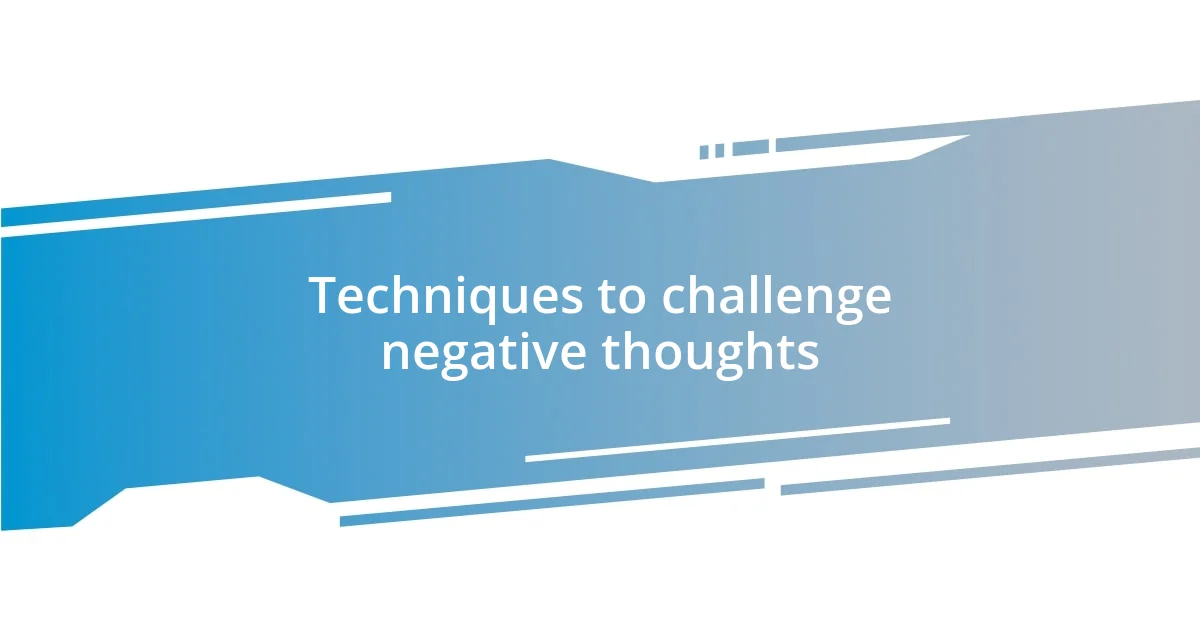
Techniques to challenge negative thoughts
Challenging negative thoughts is not just a task; it’s a journey of self-discovery. I vividly recall a moment when negative self-talk crept in as I prepared for a big presentation. Instead of surrendering to those thoughts, I practiced a technique that really made a difference: reframing. I consciously transformed my fear of failing into excitement about sharing my ideas. This simple shift allowed me to face the situation with newfound energy.
Here are some techniques that have personally helped me confront negative thoughts:
- Journaling: I kept a daily journal where I would write down negative thoughts whenever they surfaced. This helped me identify patterns and replace those thoughts with positive affirmations.
- Visualization: Visualizing success has been instrumental. I would imagine how it would feel to succeed, which filled me with optimism instead of dread.
- Self-Compassion: I learned to treat myself with kindness. Instead of lingering on mistakes, I reminded myself that everyone faces setbacks.
- Gratitude Practice: Each morning, I jot down three things I’m grateful for. This practice shifted my focus from scarcity to abundance, which countered my negative thoughts.
- Accountability Partners: I found having someone to share my struggles with—be it a friend or coach—made challenging those thoughts easier. Their perspective often provided clarity I couldn’t see in my own thoughts.
Embracing these techniques has not only helped me reaffirm my abilities but also instilled a sense of hope and resilience that I’m proud of. When I step out of my comfort zone now, I feel prepared to handle whatever thoughts may arise. It’s empowering to know that I can navigate through negativity and emerge stronger on the other side.
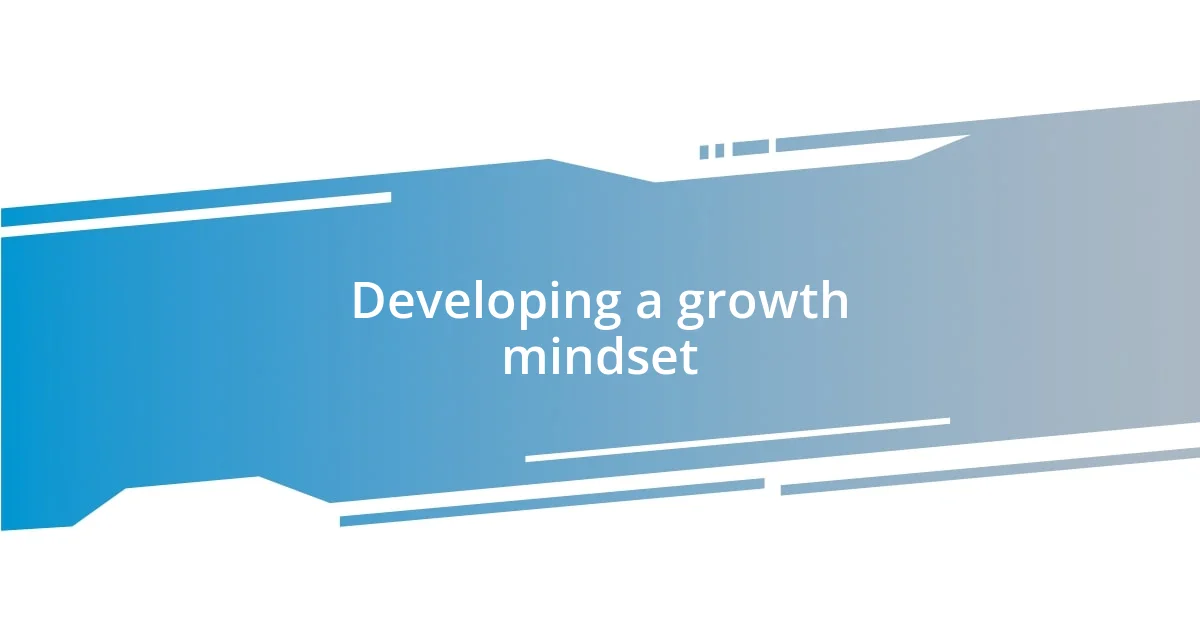
Developing a growth mindset
Developing a growth mindset has been one of the most transformative experiences in my life. I remember the first time I consciously embraced this mindset; it felt like lifting a heavy weight off my shoulders. Instead of seeing challenges as barriers, I began viewing them as opportunities to learn and grow. This shift in perspective was a game-changer for me. Have you ever considered how much your attitude can reshape your experiences? I truly believe that our thoughts exert real influence over our actions.
As I dove deeper into this growth mindset, I noticed how resilience became a companion throughout my journey. For example, I faced a tough project that seemed insurmountable at first. Instead of succumbing to stress, I tackled it step by step, celebrating small victories along the way. Every time I achieved a milestone, I felt empowered. It wasn’t about the end result; it was about appreciating the growth I experienced through the process. This has taught me that flexibility and a willingness to adapt are crucial components of success.
I often remind myself that failure doesn’t define me; rather, it’s a stepping stone toward improvement. There were moments when I stumbled, like during that one ambitious pitch meeting where my nerves got the better of me. Instead of fearing a repeat of that experience, I reframed it as an essential lesson. I asked myself, “What can I take from this situation that can make me better next time?” This reflection shifted my focus toward continuous improvement. In your own life, have you given real thought to what each setback can teach you? The answers might surprise you.
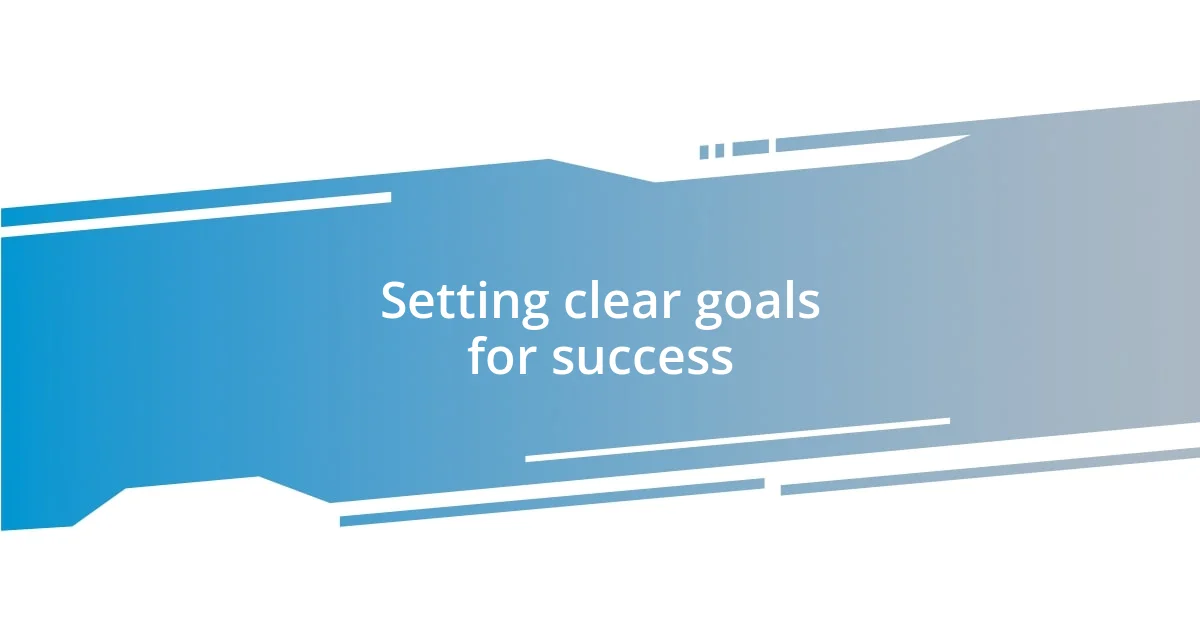
Setting clear goals for success
Setting clear goals has been a pivotal part of my journey toward success. I remember when I first set specific goals for myself; it felt like charting a course on a map. Without them, I often felt lost, drifting without direction. This feeling of purpose grounded me and transformed my daily activities into intentional steps toward achieving what truly mattered.
One lesson I learned the hard way was the importance of breaking those goals down into actionable steps. During a time when I aspired to advance my career, I created a detailed plan with milestones. I distinctly recall the thrill of crossing off each step, no matter how small. It made the process feel manageable and even enjoyable. Have you ever experienced that rush of accomplishment? It’s that little boost of motivation that propels you forward.
Moreover, writing down my goals has been a game-changer. I keep a visible list on my desk, serving as a constant reminder of what I aim to achieve. On days when I felt unmotivated, I would glance at those words and feel re-energized. It’s fascinating how setting clear intentions can bridge the gap between dreams and reality. In your experience, what impact have clear goals had on your journey? The clarity they provide can be truly transformative.
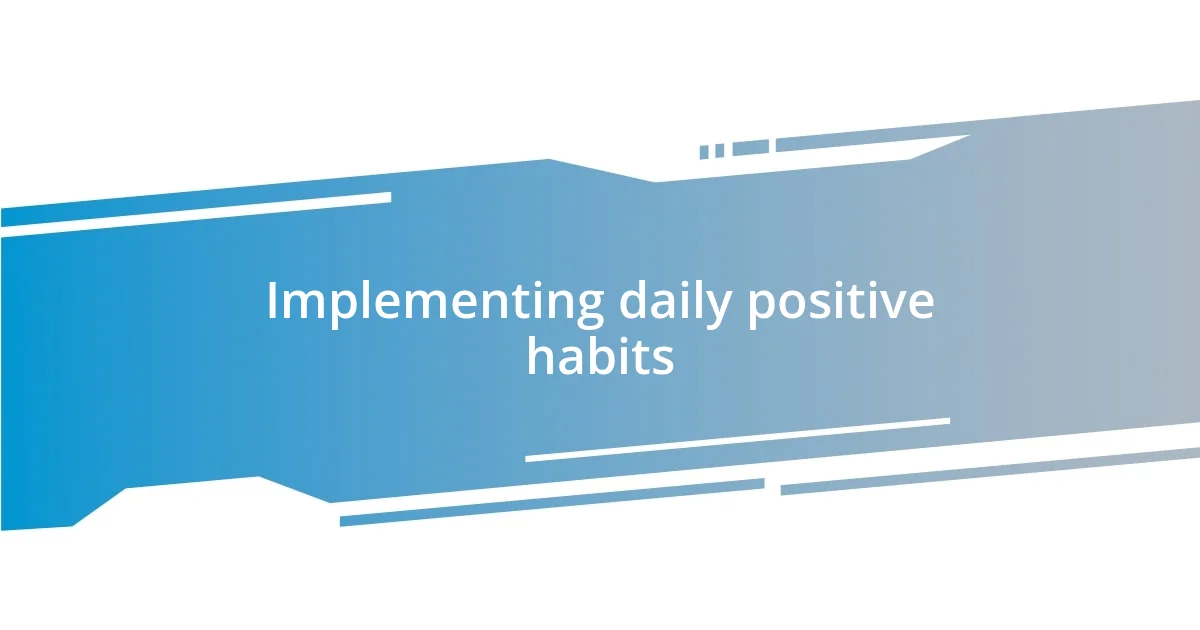
Implementing daily positive habits
Implementing daily positive habits has been crucial in my quest for success. For instance, I started each morning with a simple gratitude practice. I realized that taking just five minutes to reflect on what I’m thankful for instantly shifted my mindset, making me feel more positive and centered throughout the day. Have you tried something similar? You might be surprised by how changing this one aspect of your morning can transform your outlook on the rest of your day.
As I incorporated daily habits into my routine, I found that consistency was key. One powerful habit was dedicating time to read for personal development. At first, it felt like just another task on my to-do list, but soon it became a treasured part of my day. I remember one particular book that radically changed my perspective; I found myself eagerly anticipating my reading time, almost like a mini-celebration. What have you read lately that sparked new ideas or motivation for you?
Beyond gratitude and reading, I also began practicing mindfulness through meditation. Initially, I was skeptical; the thought of sitting still for even five minutes felt daunting. However, I discovered that these moments of stillness provided clarity and rejuvenation. Each session taught me to tune into my thoughts without judgment, creating space for positivity to flourish. Have you ever felt that sense of calm wash over you after just a few mindful breaths? It’s incredible how little adjustments can have profound impacts on our overall well-being.
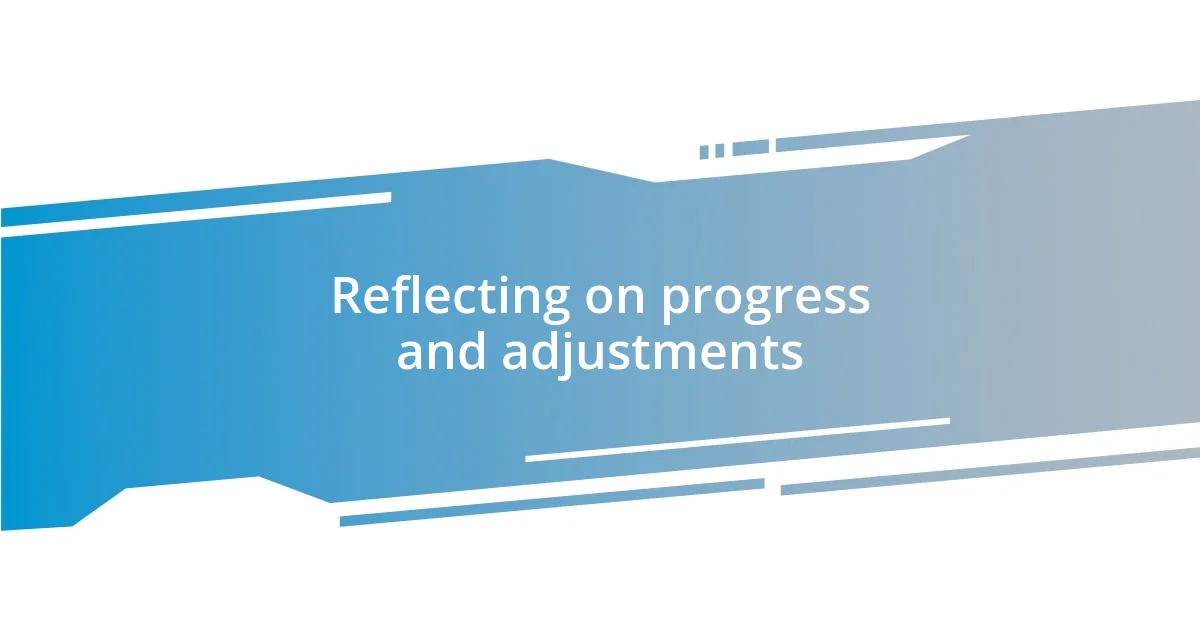
Reflecting on progress and adjustments
Reflecting on my progress has been an enlightening experience. One time, I took a weekend to review my achievements from the past year. I created a visual board with pictures and notes that represented my milestones. As I looked at it, I felt a wave of gratitude wash over me. It was a reminder of how far I had come and the struggles I had overcome. Have you ever paused to celebrate your own small victories? It can be quite eye-opening.
Adjustments have been pivotal in my journey as well. After realizing that my initial approach to work-life balance wasn’t sustainable, I reassessed my schedule. I used to squeeze in late-night tasks, but this habit drained my energy. By reallocating my time to prioritize rest and leisure, I noticed a significant boost in my productivity. Reflecting on this shift, it struck me how essential it is to adapt and be flexible—our plans might not always align with reality. What adjustments have you made that turned out to be game-changers for you?
I’ve found that journaling my reflections has become a therapeutic practice. On days when I felt overwhelmed, I’d spill my thoughts onto the page, processing my feelings and clarifying what needed adjusting. It’s like having a heart-to-heart conversation with myself. Through this practice, I gained insights into recurring patterns and beliefs that held me back from reaching my true potential. Have you tried journaling? It can be a powerful tool for self-discovery and growth.












